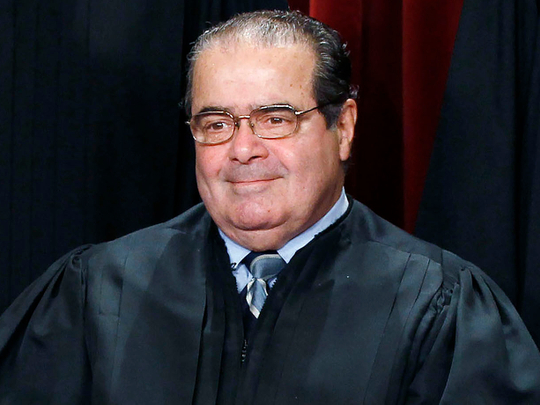
Washington: Antonin Scalia, the influential conservative and most provocative member of the Supreme Court, has died, leaving the high court without its conservative majority and setting up an ideological confrontation over his successor in the maelstrom of a presidential election year. Scalia was 79.
The US Marshals Service in Washington confirmed Scalia’s death at a private residence in the Big Bend area of West Texas.
Scalia was part of a 5-4 conservative majority — with one of the five, Anthony Kennedy, sometimes voting with liberals on the court. Scalia’s death leaves President Barack Obama weighing when to nominate a successor, a decision that immediately sparked a political struggle drawing in Congress and the presidential candidates.
The immediate impact of his death for the current term means that the justices will now be divided 4-4 in the most contentious cases. If there is a tie vote, then the lower court opinion remains in place. Cases where the current court was expected to split 5-4 include disputes over abortion and immigration policy.
Senate majority leader Mitch McConnell, as well as Republican presidential candidates Ted Cruz and Marco Rubio, said the nomination should fall to the next president.
Democrats were outraged at that idea, with Sen. Harry Reid, the chamber’s top Democrat, saying it would be “unprecedented in recent history” for the court to have a vacancy for a year.
Leaders in both parties were likely to use the high court vacancy to implore voters to nominate candidates with the best chance of winning in the November general election.
Obama was golfing in California on Saturday afternoon, before a summit with Asian leaders, when he learned of Scalia’s death, and sent his condolences to the family, the White House said.
Scalia used his keen intellect and missionary zeal in an unyielding attempt to move the court farther to the right after his 1986 selection by President Ronald Reagan. He also advocated tirelessly in favour of originalism, the method of constitutional interpretation that looks to the meaning of words and concepts as they were understood by the nation’s founding fathers.
Scalia’s impact on the court was muted by his seeming disregard for moderating his views to help build consensus, although he was held in deep affection by his ideological opposites Ruth Bader Ginsburg and Elena Kagan. Scalia and Ginsburg shared a love of opera. He persuaded Kagan to join him on hunting trips.
His 2008 opinion for the court in favour of gun rights drew heavily on the history of the Second Amendment of the US constitution guaranteeing the right to bear arms and was his crowning moment on the bench.
He could be a strong supporter of privacy in cases involving police searches and defendants’ rights.
But he also voted consistently to let states outlaw abortions, to allow a closer relationship between government and religion, to permit executions and to limit lawsuits.
He was in the court’s majority in the 2000 Bush v. Gore decision, which effectively decided the presidential election for Republican George W. Bush.
A smoker of cigarettes and pipes, Scalia enjoyed baseball, poker, hunting and the piano. He was an enthusiastic singer at court Christmas parties and other musical gatherings.
Ginsburg once said that Scalia was “an absolutely charming man, and he can make even the most sober judge laugh.” She said that she urged her friend to tone down his dissenting opinions “because he’ll be more effective if he is not so polemical. I’m not always successful.”
Quick-witted and loquacious, Scalia was among the most persistent, frequent and quotable interrogators of the lawyers who appeared before the court.
Scalia’s writing seemed irrepressible and entertaining much of the time. But it also could be confrontational. It was a mocking Scalia who in 1993 criticised a decades-old test used by the court to decide whether laws or government policies violated the constitutionally required separation of church and state.
“Like some ghoul in a late-night horror movie that repeatedly sits up in its grave and shuffles abroad, after being repeatedly killed and buried, (the test) stalks our ... jurisprudence once again, frightening the little children and school attorneys,” he wrote.
Scalia showed a deep commitment to originalism, which he later began calling textualism. Judges had a duty to give the same meaning to the constitution and laws as they had when they were written. Otherwise, he said disparagingly, judges could decide that “the constitution means exactly what I think it ought to mean.”












